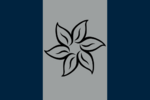Aelandian-Takaria
This article is incomplete because it is pending further input from participants, or it is a work-in-progress by one author. Please comment on this article's talk page to share your input, comments and questions. Note: To contribute to this article, you may need to seek help from the author(s) of this page. |
Autonomous Republic of Aelandian-Takaria Takarii-Äjetaan Aelandian-Takaria | |
|---|---|
|
Flag | |
| Anthem: "'O My Tujovaan" | |
| Capital | None (de jure) Tirkataan (de facto) |
| Largest city | Pahjatointä |
| National language | Tujovii Aelandian |
| Ethnic groups | Tujovii |
| Demonym(s) | Tujovaani |
| Government | Federal Republic |
• Prime-Minister | Vera Öjatin |
| House of the Republic | |
| Lower House of the Republic | |
| Population | |
• 2025 estimate | 17,000,000 |
• 2023 census | 16,283,581 |
| Currency | Schilling (AES) |
| Time zone | UTC-07:00 |
| Date format | yyyy/mm/dd |
| Driving side | right |
| Calling code | +13 |
| ISO 3166 code | TVN |
| Internet TLD | .tv |
Tujovaan officially Ripubliku Avtöna Takarii-Äjetaan or Autonomous Republic of Aelandian-Takaria is an Aelandian Oversees Autonomous Republic located in Central-Takaria. The Republic consists of 6 provinces with Rentanmaa being the province with the most inhabitants. The largest city is Pahjatointä with 3,000,000 residents. The city of Tirkataan holds the Ripubliku torvjanöö which means House of the Republic and is seen as the de facto capital of Aelandian-Takaria. Tujovaan's largest cities are Pahjatointä, Saahileiksta, Kurtuuna, Voitumaari and Kalatrajouitö.
Tujovaan has 6 provinces, Rentanmaa, Kojoni, Vitorii, Latante, Tüntine and Rejnolää with 17,000,000 citizens spread between them. Every province has it's own dialect with differs slightly from the other provinces. Together with the provincial dialect people are also taught Tujovii Stoijastö meaning Standard Tujovii together with Aelandian.
Etymology
The name Tujovaan comes from the proto-Tujovii word Tarvivaan meaning "home". In proto-Tujovii the difference between a nationstate and a house did not exist and both used the same word which is still in effect today. With the linguistic shifts Tarvivaan has become Tujovaan which means home in modern-Tujovii
